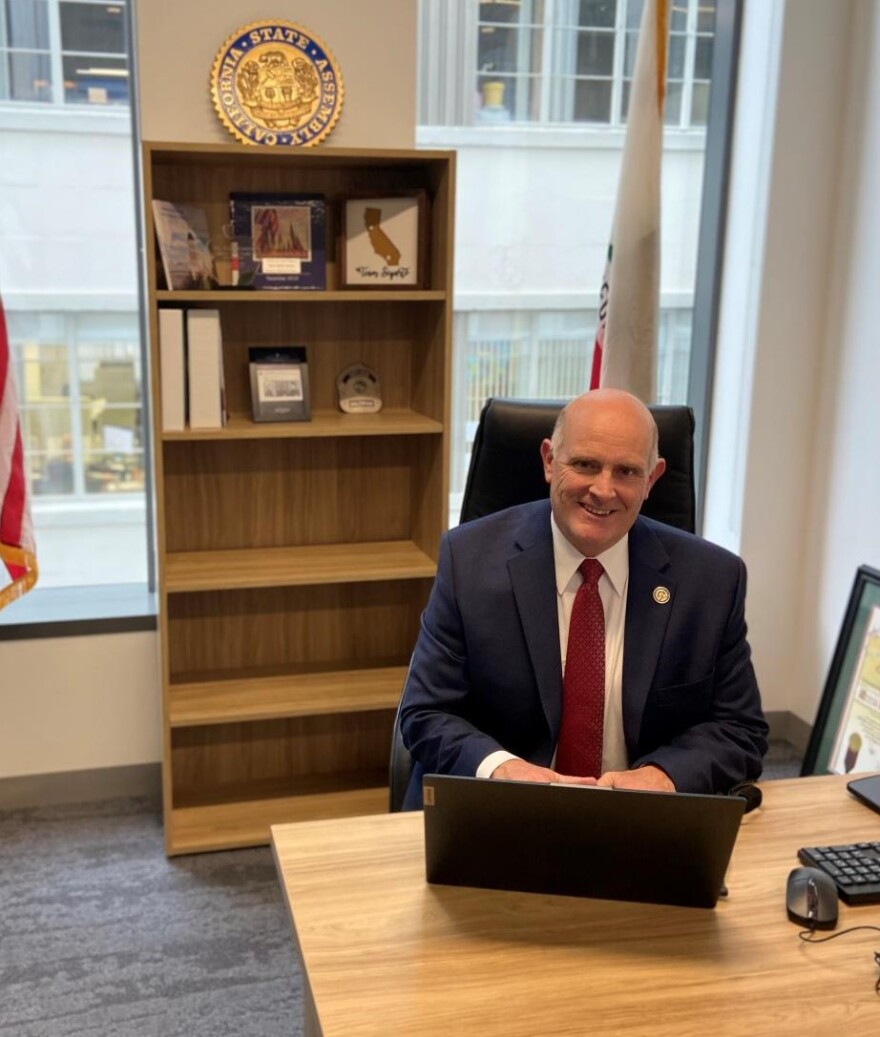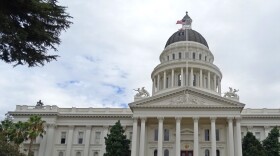Jonathan Linden: You're listening to 91.9 KVCR news, and I'm Jonathan Linden. Republican assemblymember Kelly Seyarto represents assembly district 67, which includes the cities of Murietta, Lake Elsinore, and a portion of Riverside. To get started, assemblymember, can you tell listeners more about your bill AB 1687, which you're calling the California Emergency Services Act?
Kelly Seyarto: So, AB-1687, essentially, the governor can declare a state of emergency, and currently, under California law, it's a little ambiguous what the powers are. And so, the powers are all-encompassing, there's about 25 other states that have essentially the same type of law, but they are more specific in that, what they limit the state of emergency, the powers to the actual state of emergency. So that's what it's meant to do, it's meant to take a little bit of the ambiguity out of it, and kind of more narrowly define what exact emergency powers get to be enacted, and what doesn't, because we've learned through the pandemic, the wide scope of emergency powers, and now after looking, we kind of did some research on it, and looking at what other states do. And so, we found what we consider a weakness in ours, and so 1687 essentially just clarifies in law that the powers of the governor to suspend or alter law and regulations during a state of emergency, are only allowed to the effect of addressing the actual state of emergency that he has declared. So, if it's related to health, its health concerns, if it's related to mitigating fire, things that are related to doing those are the things that he can deal with. And the other things still are applied through the checks and balances that we depend on for all of our laws. And that's the legislature, the executive branch, and the judicial branch. So that's why we have checks and balances, and this is meant to try to ensure that that doesn't get set aside, just for the declaration of emergency.

Jonathan Linden: And I presume this is a direct response to how Governor Newsom has acted throughout COVID-19. It seems like you've had issues with what he's been doing, can you elaborate more on that?
Kelly Seyarto: Well, you know, I think a lot of people have had some issues with some of the executive orders that have come out. But this really wasn't meant to delve into that; it was just meant to, you know, over the past years of looking at this emergency power issue, it's meant to strengthen our law. So that going into the future, where we have a lot more clarity because I think sometimes the legislature does feel left out. Or some things that, and I'm not going to be specific on them because off the top of my head, I'm not making any accusatory comments towards what has been done and what hasn't. What I'm really specifically trying to do is, going forward, ensuring that when we declare a state of emergency that those powers are narrowly focused on that state of emergency. And, and like I said, us, the folks in the legislature, have kind of felt left out on some of the issues that have come forth. And, and so we just need to be more careful with that and tighten up that regulation. So that's really what the intent of it is to do, is identify weaknesses and tighten up regulations so that we continue to have the checks and balances that people need in California to be confident in their government.
Jonathan Linden: And this was co-authored by four of your fellow assembly members and three state senators. I believe all of them are Republican colleagues. Do you have any bipartisan support? Have you had conversations with Democrats about this bill?
Kelly Seyarto: Well, you know, I think people are trying to relate it to the pandemic, and that's why we're not relating it to the pandemic. What we're relating it to is for two years, the legislature has been kind of left out of the picture. And I can't answer for the Democrats, but I know this has been a concern of Republicans that, you know, we need to be able to keep some of these regulations and discuss them before we change them or create them. And if it's not related to the actual matter at hand that we are having an emergency about, then why are we skipping the legislative process?
Jonathan Linden: And in this very polarized political climate where Democrats have a supermajority in the State Assembly and State Senate, how do you approach that situation as a Republican and try to get legislation passed?
Kelly Seyarto: Well, you know what, at the end of the day, people are people, and you need to connect with people on a personal level. Yes, we have a lot of ideological differences, and we have a lot of differences in the way we approach some of the issues that are out there and with the way we prioritize even. And I think it's first really important to connect with people on a personal level, and that's what I tried to do is make sure that you know, I don't connect them to the ideology; I connect with them as a person. And once you've established that, then you can have rational conversations about your bill without it automatically being dismissed because the author has an R next to it or dismiss because the author has a D or an I next to it. So, you know, for me, that's my approach. And it works; I've had some success in getting some bills that people didn't think would get heard through; I had a couple of bills last year that actually got signed by the governor. And so, there’s successes in doing that, but that does not mean that you compromise what you stand for. Basically, it's just trying to take some of what, you know, some of the nastiness out of a relationship and get back to where you can actually discuss issues rationally. And at the end of the day, if you disagree, you disagree, but at least their ears are open to hear. And that's what you want; you want people to at least consider because there are a lot of good ideas on both sides. I think the weakness that we have right now is that one side really doesn't have to be listened to at all. And that's something that I think only the voters in California can rectify by helping balance the state out so that we have better conversations about the bills that we're passing.

Jonathan Linden: And do you have specific examples of fellow assemblymembers or state senators that you've worked with that are based out here in the Inland Empire, where you've worked to put a bill together or anything like that?
Kelly Seyarto: Well (I've worked with) Sabrina Cervantes, related to women's rights and health and things like that. I've also gone up on bills with Jose Medina, haven't worked with him personally, but all of the inland folks work pretty well (together), as far as on that, like, I was telling you, the personal level, I think we're all friendly to each other and stuff. But yeah, at the same time, a lot of times, the bills are just not the type that, you know, they're gonna run it and, you know, try to get support. And usually, a lot of times, because there's a lack of communication between the two sides, that they wind up going up, and it's a very partisan looking vote, you know, the D's vote one way and the R's vote the other. And the result is always the same, it just goes through, there's really no incentive for people to reach across the aisle from that side; we're the ones that have to do the reaching and that's just the reality of it.
Jonathan Linden: And assemblymember, is there anything else you would like to share with listeners, whether that be about some of your other bills that you have on the docket right now or other projects?
Kelly Seyarto: Well, I do have one election law bill; it's AB-1693. And I think you've heard about some of the efforts to address what they think is a broken recall system. And I've sat through three hearings on it. And one of the things that I think is broken or is not fair is that an incumbent who is the subject of a recall can basically raise unlimited funds, like in the governor recall race. On one side, you had people that had to abide by election law limits, and then the other side, you can raise $1.2 million from one source, if they wanted, if that source wants to give them that money. So, that kind of creates an unlevel playing field and also excludes people from the process because people are thinking, we can't compete with that. And so that's something that I think should be looked at as a reform measure when they're talking about reform, and that's AB 1693. So those are ones that are kind of related to the subject that we're talking about on the radio today. But you know California, I just want to encourage people to really look at, you know, trying to balence the state out a little bit, so that we have a more even-handed process to be able to deliberate and make the best bills we can for California and make sure that bills aren't harming us, we can't have 25% of the population of California not being heard, that's just not a good way to be leaders. And I think that's the biggest thing that's lacking right now is we need that type of leadership to come back. So that's what I would encourage people to be looking at things like that.
Jonathan Linden: Alright, well, assemblymember Kelly Sayarto it's been a pleasure speaking with you. Thank you so much for your time.
Kelly Seyarto: Alright. Well, thank you for taking the time today, and appreciate your efforts to get the words out on some of these issues. Thank you.






